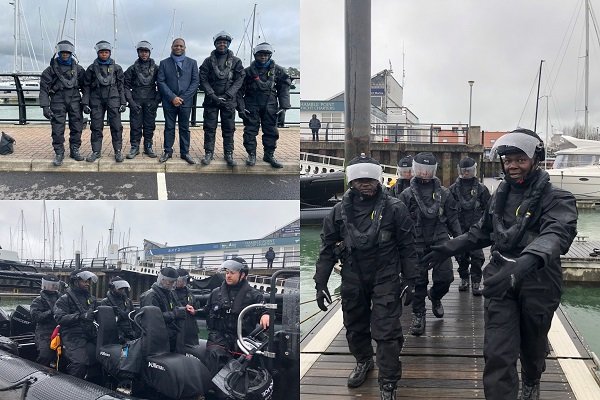The National Drug Law Enforcement Agency (NDLEA) has intensified its maritime surveillance operations with the completion of an advanced international training programme for its officers in the United Kingdom.
A six-man delegation from the Agency’s Directorate of Seaport Operations, led by Deputy Commander of Narcotics (DCN) Aminu Danjuma Jega, was in the UK between October 19 and 25, 2025, where they received hands-on exposure to global best practices in maritime intelligence, port security, and joint enforcement procedures. The visit was facilitated by Mr. Errol Flynn Macdonald of the UK Home Office International Operations (HOIO).
In addition to the UK trip, no fewer than 19 NDLEA officers also completed a four-day Advanced Container Targeting training in Lagos from November 10 to 13, conducted by HOIO intelligence experts. Both the international and in-country sessions were fully sponsored by the UK government through the Home Office International Operations.
During the UK engagement, the NDLEA team held strategic discussions with key British agencies, including the UK Border Force, National Crime Agency (NCA), Home Office Intelligence, the National Maritime Security Centre, and the Joint Maritime Security Centre in Portsmouth.
Read Also:
- Tinubu extends Marwa’s tenure as NDLEA Chairman to 2031
- UAE pledges support for NDLEA, hails Marwa’s drug war efforts
- NDLEA, DEA, NCA probe ₦338bn cocaine haul seizure at Lagos port
The officers also received detailed presentations from the UK National Deep Rummaging Team, learning modern techniques used in vessel rummaging to detect drug consignments hidden in ship compartments. They participated in live demonstrations at Tilbury and Felixstowe Ports, where containers arriving from Nigeria were subjected to multi-layered screening and risk-based inspections.
A major highlight of the visit was the introduction of the Advanced Sea Searcher System, a high-precision underwater detection technology capable of identifying concealed contraband beneath ship hulls and port structures. NDLEA officials described the system as a potential “game-changer” for maritime counter-narcotics operations in Nigeria.
Presenting the report of the training to NDLEA Chairman/Chief Executive, Brig.-Gen. Mohammed Buba Marwa (rtd.), delegation leader Jega said the exposure significantly deepened the agency’s understanding of intelligence-led maritime enforcement.
“We were exposed to advanced tools, data-sharing models, and inter-agency coordination frameworks that will significantly improve maritime intelligence and port surveillance. The practical demonstrations, especially in vessel rummage and underwater detection, are invaluable to our fight against drug trafficking through the seaports,” he said.
Responding, Marwa commended the officers for representing Nigeria effectively and reiterated the agency’s resolve to upscale its technical capabilities.
“Maritime routes remain critical in global drug trafficking networks. Strengthening our officers’ capacity and intelligence integration with international partners is essential to safeguarding Nigeria’s borders. Lessons from this UK engagement will be vital in enhancing NDLEA’s effectiveness in intercepting drug consignments at sea,” Marwa stated.
He added that the NDLEA will sustain and expand its collaboration with the UK Home Office International Operations and other international law enforcement bodies in the fight against transnational drug trafficking.
The statement was issued by Femi Babafemi, Director of Media and Advocacy, NDLEA Headquarters, Abuja.






